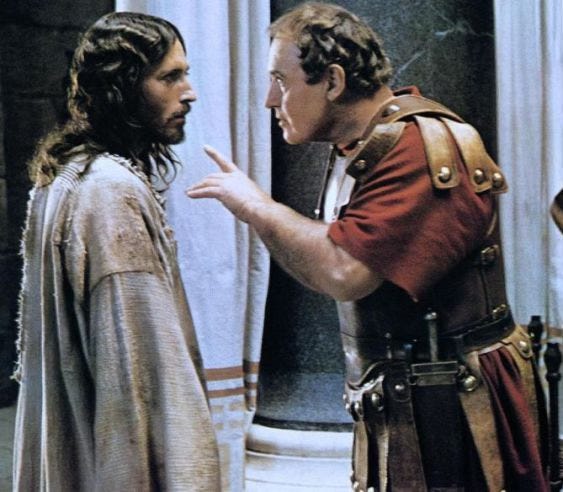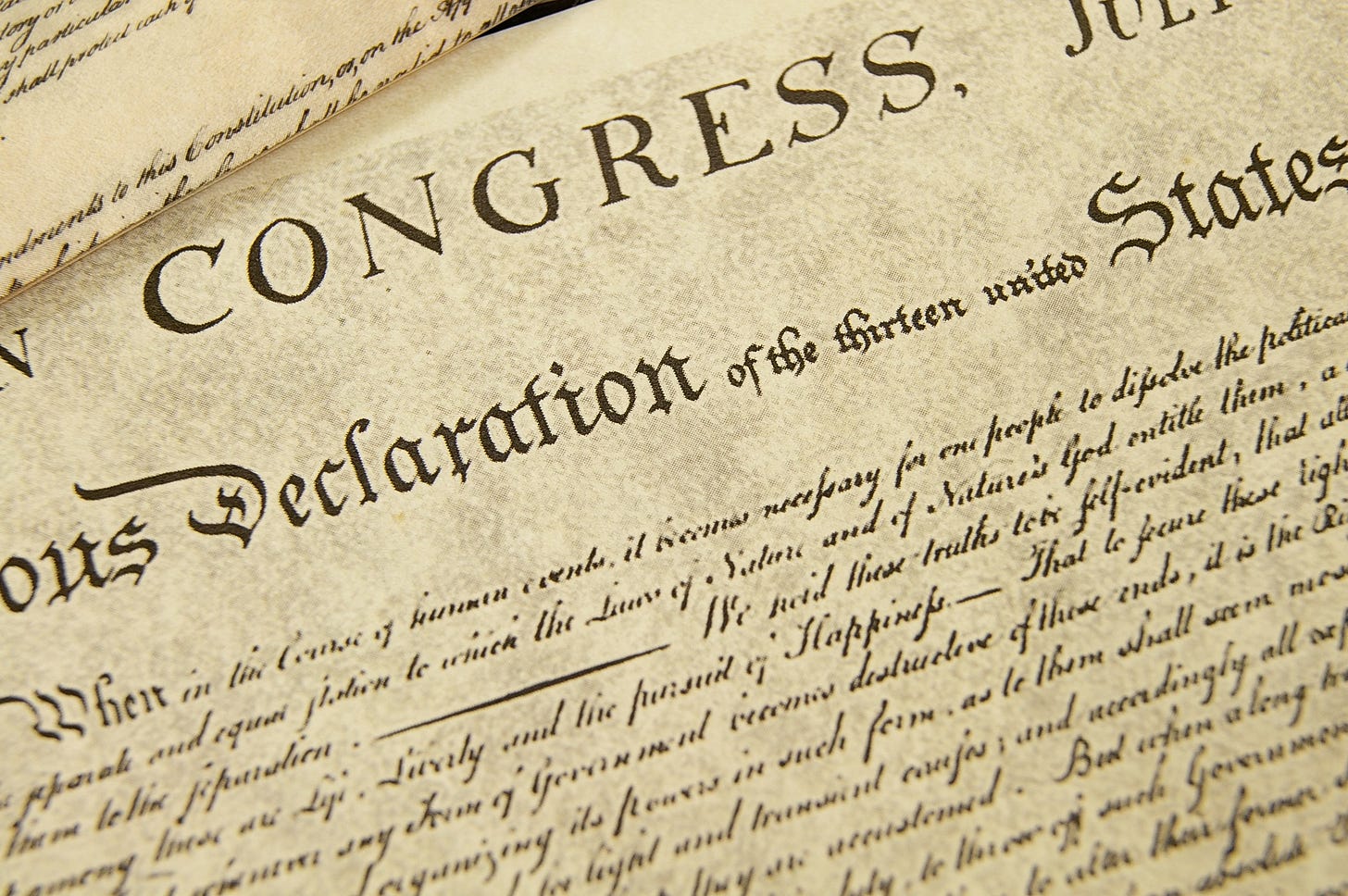By Mark Strand
One of the familiar passages from the Easter story is Pontius Pilate’s questioning of Jesus. Pilate was essentially the only government in Jerusalem and had near-dictatorial powers. But he was also a politician. Rome was where the action was, and the way to get there was to perform well enough on undesirable assignments (of which Israel certainly was one) so that he could get promoted to a more desirable position elsewhere.
From the Gospel accounts, Pilate seems pretty sure that Jesus was not guilty of anything. The Pharisees, seeing Jesus as a threat to their power, wanted to have him killed, but as an occupied territory, they had no such power. So, their argument to Pilate was that Jesus claimed to be a King, which they argued was a direct threat to Caesar. Being no fool, Pilate was not tricked (the Pharisees were hardly worried about Caesar’s sovereignty) but nonetheless wanted to maintain whatever goodwill he could with the Pharisees to prevent a rebellion that would not please Rome.
So Pilate decides to question Jesus separately from the crowd. He asks Jesus if he is a king.
Jesus responded, “You say I am a King. To this end was I born, and for this cause came I into the world, that I should bear witness to the truth. Everyone who is of the truth hears my voice.”
To which Pilate replied, “What is truth?”
Pilate, probably a well-educated Roman, undoubtedly studied his Greek and recognized this as a question of philosophy, not criminal law. Nonetheless, he was more interested in his political career than in what truth was and eventually betrayed his conscience for what was politically expedient and sentenced Jesus to death.
Some things in politics never change.
However, “what is truth” is fundamental to who we are as human beings, what kind of civilization we will have, and how we will be governed.
The Declaration of Independence proclaims, “We hold these truths to be self-evident, that all men are created equal and that they are endowed by their Creator with certain unalienable rights, that among these are life, liberty, and the pursuit of happiness.” Moreover, “To secure these rights, Governments are instituted among Men, deriving their just powers from the consent of the governed.”
However, “what is truth” is fundamental to who we are as human beings, what kind of civilization we will have, and how we will be governed.
The very foundation of the American system of government is based on the answer to the question, “What is truth?” The truths described in the Declaration deal with the inherent dignity of each person and the purpose of government, which is to protect that dignity. This is not just a nifty idea a few sons of the Enlightenment thought up while drinking mead. It goes to the very concept of truth, which must be objective and timeless.
Being objective and timeless means that it will never be right for the government to take a life for its own utilitarian purposes, to take away the liberty of freedom of speech or freedom of religious expression, or to tell you where to work, who to marry, or how to live your life (assuming you are not hurting others).
Truth is objective, which means it is not within the government’s competence to redefine truth. Of course, many governments do. Communist countries were famous for putting all kinds of rights granted by the State into their constitutions. But of course, a government that grants rights can take those rights away just as quickly. But even many modern democracies have substituted “values” for rights. Certainly, rights create specific values (also timeless), but too often, terms like “our common values” are little more than political platforms or the latest cultural fashion – changing with the times or even with the next election.
The United States has, over its history, been blind to certain truths. And we have paid a dear price for it, including a Civil War that killed 600,000 people. But our Constitution was created to be self-correcting so that while we will never make a perfect government, we will strive to create a more perfect union.
Why is the truth so important? Besides defining the struggle between God and man, it also establishes the worth each of us has as individuals.
Civilization depends on the belief in the dignity of every human person. From conception, every human possesses intrinsic dignity and worth as a person created in the image of God. Civilization is the rejection of the doctrine of might makes right and rule by a chieftain (whatever form that might take) over the tribe. It is the placing of the individual's rights above the interests of the collective.
Political freedom is essential for recognizing and respecting this inherent dignity. Human dignity is upheld when individuals can make choices, participate in society, and express their beliefs. When people are deprived of political choice, their dignity is threatened.
Political freedom provides the necessary conditions for individuals to exercise what John Paul II called “authentic freedom” responsibly. The Declaration referred to this as the pursuit of happiness. In a political system that respects human rights and allows for participation in the decision-making process, individuals can pursue their own well-being and the common good while respecting the rights and freedoms of others.
Human dignity requires freedom from coercion, oppression, and totalitarian regimes restricting fundamental human rights, including religious freedom, freedom of speech, and freedom of association.
Political freedom should be grounded in a moral and ethical framework. While individuals should be free to make choices, in a healthy society, these choices should align with moral principles and the common good. A society without moral foundations could degenerate into license and moral relativism. Various philosophers have described the paradox of democracy, where freedom unbounded by an ethical framework becomes license and ultimately undermines, erodes, and eventually invites government action that restrains authentic freedom.
Political freedom is an essential aspect of authentic human freedom. Without it, individuals cannot pursue their personal and collective well-being while respecting the dignity and rights of others.
This might have been taken for granted not many years ago, but no longer. Indeed, authoritarian states are threatened by these truths, as evidenced by the fate of political opponents and the bombing of Ukrainian civilians by Vladimir Putin in Russia, the shrieks of death to Christians and Jews coming from Iran, and the religious persecution in China, North Korea, and Cuba. But it is also as close as your local college campuses where radical professors teach that there is no truth, that there is no moral difference between our society and a socialist one, or that killing and oppressing Jews (“from the river to the sea”) is not a violation of moral law.
The conflict is real. In progressive or socialist states, the individual’s value hinders a utopian society. The collective is what is essential. What is your value, as an individual, to the State? If you are healthy and can work, then you have value. If you are sick or disabled, you are a drain and, therefore, a threat to the State. Maybe you are from the wrong religion or undesirable ethnicity. Perhaps you are speaking out against the government and might influence the thinking of others against the collective. Your utility equals your value to the State.
And let’s be honest about the abortion issue today. The law is not the issue. It is the value and dignity of individual life. We see it every day. If a baby is wanted, it is celebrated. The parents hold a party to reveal their gender. Doctors prescribe vitamins and numerous sonograms to check on the baby’s health. Mothers invite loved ones to feel their baby kick. They play classical music and read to the baby to stimulate brain development and bonding. They are already in love with their child long before it is born.
But what about the same baby that is unwanted? Maybe the circumstances of the pregnancy are problematic and troubling. Maybe the doctors think there might be a medical issue. Perhaps the timing is just inconvenient. Maybe a Hollywood star or Instagram influencer thinks having a baby might hurt their livelihood. All of a sudden, this baby is whatever impersonal term we can come up with – fetus, a blob of protoplasm, a product of conception—anything to make the baby inhuman and, therefore, expendable.
It is a form of cultural schizophrenia that we seemingly cannot reconcile.
What the laws say doesn’t matter; what is in the human heart matters. It is how we all answer the question of “What is truth?”
Pilate’s question will always remain very important. Pilate placing his political career above the question of truth will also remain a constant in all political systems. The question for everyone living in free societies is whether we will defend the truth and help others fight for their human dignity against those for whom truth is an inconvenient road bump on the way to personal gratification or political power.
It is not just a question for Easter. Indeed, Christians believe that Jesus is the answer to that question. But it is a question for all who believe in the worth and dignity of every human life and want to live in a society that protects it.
So, when considering what kind of society you want to live in, how you want to be governed, and what is the best way to protect the freedom, dignity, and life of your family, neighbors, and country, periodically, it is essential to ask yourself the question Pilate asked of Jesus.
What is truth? And unlike Pilate, are you willing to defend it?





A brilliant, sound article.
As a former newspaper editor, I always wanted to replace the motto on our masthead with Pilate's famous and essential quote. The pursuit of truth should be the mission of every journalist and every human being.